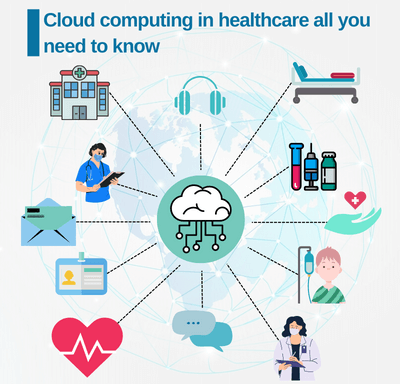
About us
Our Services
Our Expertise
Our Experience
Follow us
Why e2logy?
- We strive to provide superior customer service and ensure that every client is completely satisfied with our work.
- Our engineers are trustworthy, dedicated, and experienced and will go the extra mile to solve your IT issues.
- We are committed to delivering outstanding, cutting-edge IT solutions that add real value that goes beyond what is expected.

Cloud Computing in Healthcare: All You Need to Know

As a result of the amount of private and sensitive information involved and the vast number of processes involved, the healthcare industry is complex. There are two major challenges in the health industry that arise from its complexity: increasing operational costs (including data storage costs) and difficulty in building self-sufficient health ecosystems. A major challenge faced by the healthcare industry can always be overcome with the help of technology. Cloud computing is one of these technologies. Several years ago, this technology was used in the healthcare industry and continues to evolve with changes in the industry. Collaboration, scalability, reachability, efficiency, security, and efficiency are some of the features that cloud computing is bringing to the healthcare industry at different levels.
Data backup, software development, testing, recovery, and many other purposes are carried out using cloud computing in the IT industry. Service providers are developing solutions using various use cases in response to the advancement of this emerging technology. Cloud computing has been adopted by industries ranging from healthcare to automotive to education. We are going to talk about the role cloud computing plays in the healthcare industry in this blog.
What is cloud computing?
IT and data storage infrastructure have become more reliable due to the growing demands of technology. Cloud technology has captured the attention of the world in the past few years.
A cloud computing environment is characterized by the availability of computing and storage resources on demand. Data centers located across multiple locations from a central hub are referred to as “clouds” because they are generally available to users via the Internet.
Documents can be stored in the cloud and accessed from anywhere at any time via any device. It was originally necessary to use a server or computer that you could access only from a specific location to run all the applications and software. Using the internet, people now have access to their information and programs thanks to the cloud. Data storage is also subject to this principle.
However, it is possible to back up your critical work to the cloud or store it remotely on your computers and servers.
What is cloud computing in healthcare?
Healthcare cloud computing refers to the practice of storing, managing, and processing healthcare data using remote servers accessed online. A data center or hosting the data on a computer is an alternative to establishing an on-site data center.
In a secure environment that is maintained by IT professionals, cloud storage allows healthcare professionals and hospitals to store large volumes of data in a flexible and secure environment.
Electronic medical records (EMRs) have become a standard method of storing and protecting patient records across the US since the introduction of the Electronic Medical Records (EMR) mandate.
The Benefits of Cloud Computing
Physicians and patients alike can benefit from cloud computing in healthcare. A few of the benefits of using cloud systems for healthcare are cost savings, enhanced privacy, and better patient care through collaboration and interoperability. Healthcare providers and patients benefit from cloud computing when it comes to business outcomes.
1. Data storage services that are affordable
Thousands of gigabytes of data are generated by healthcare providers every year. Health records, laboratory tests, insurance claims, and prescriptions are among the data included in these records.
Cloud computing technology can make managing data easier for healthcare institutes. Aside from storing more data, cloud computing provides analytical tools and allows users to use their data in more meaningful ways.
2. Enhances the collaborative care of patients
As a result of cloud storage, Americans can collaborate on patient care more efficiently. Having a patient’s medical records stored in the cloud allows doctors to view or share them collaboratively.
Patient records used to be separated between doctors, specialists, and hospitals, making it hard for doctors to collaborate.
As cloud storage is increasingly adopted in hospitals, doctors can easily share information, see the results of previous interactions between physicians and patients, and customize their care based on previous encounters.
3. A simple approach to interoperability
In the healthcare system, interoperability merely involves data integration. No matter where the data originates or where it is located, this integration is possible.
Using cloud-based healthcare solutions means providing flexible access to patient data and optimizing patient care by enabling interoperability.
Medical professionals can also access patients’ medical data in the cloud from a variety of sources using cloud computing in healthcare. Providing primary stakeholders with this data and delivering protocols on time is feasible for them.
4. Secures data to a higher standard
It used to be a significant risk of data theft or damage for physicians who kept reams of patient records in filing cabinets. Natural disasters such as floods, fires, or other natural disasters can destroy paper records. Patient safety was at risk due to these documents not being secured.
If the EMR mandate is implemented, healthcare providers could implement their own data infrastructure on-site, but protecting patient data would require IT staff well versed in data security.
A HIPAA-compliant cloud storage service is an alternative that healthcare providers can use to store and protect their data. Data security and privacy regulation requirements are met with these services when storing patient EMRs. Data storage solutions based on the “cloud” are now available to healthcare providers that provide secure storage of patient data.
5. Providing better patient care
Cloud computing solutions make it easier for doctors to provide better patient care. Doctors are closely involved in every step of treatment. Therefore, the organization can provide better care for patients by accessing laboratory results, medical information, and doctor notes in real-time. It reduces the number of unnecessary lab tests (unnecessary prescriptions) by using cloud computing in healthcare.
6. Scalable and flexible
The long-term benefits of cloud storage over in-house data storage extend beyond the immediate cost savings. Hospitals and healthcare facilities benefit from economies of scale when they use cloud storage solutions for their data management.
Cloud computing allows healthcare providers to pay-per-use for data storage costs, allowing them to be more flexible. Data storage solutions built by healthcare facilities must be sized appropriately and their capacity expanded as needed as the storage space runs out. You can scale up and down your healthcare business with cloud-based solutions. You simply need to talk to your cloud-based provider to increase storage capacity.
7. The ability to collaborate better
In healthcare, cloud technology improves collaboration as well. EHRs (electronic health records) and EMRs (medical records) remain in the cloud, so patients don’t need to carry individual records to the doctor.
Doctors are also able to share information, check previous consultations, and share data. The doctor and patient will both save time by doing this. Thus, the doctor can form a precise diagnosis and treatment plan.
Several significant risks are associated with cloud computing in the healthcare industry, as well as many benefits.
8. Enhance the interoperability of data
We will soon see an increasing amount of interoperability between connected medical devices and systems and applications storing patient data as digital health moves into the next decade. We’re missing out on many of the benefits of a connected healthcare environment because a growing number of product developers are building IoT-enabled devices for the industry.
Cloud computing in healthcare will serve as the primary platform for storing and maintaining all the data generated from wearable connected devices, mobile health applications, and electronic health records shortly. As healthcare’s landscape changes, organizations that expand their cloud capabilities will become more effective at adapting to the changes.
Conclusion
Several ways can be explored for implementing cloud computing in the healthcare industry. Healthcare providers and clinics benefit from cloud computing in several ways, from reducing healthcare costs to improving communication with patients. Medical organizations are undoubtedly considering adopting cloud solutions, according to the latest reports. A lack of internal technical resources or security concerns is the main obstacles.













